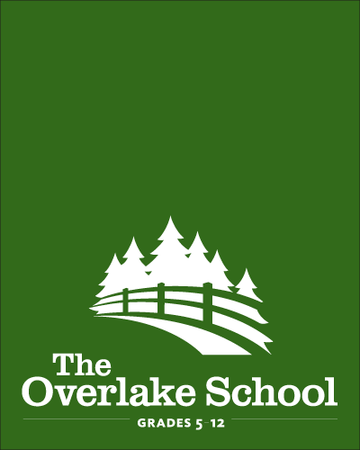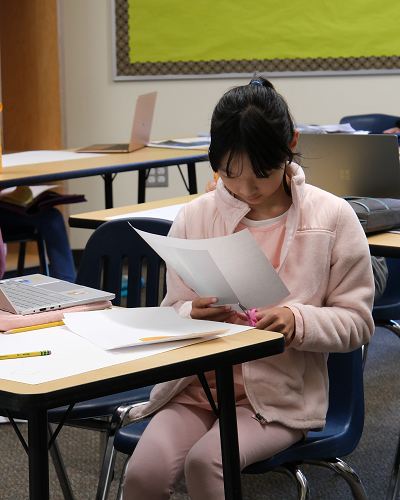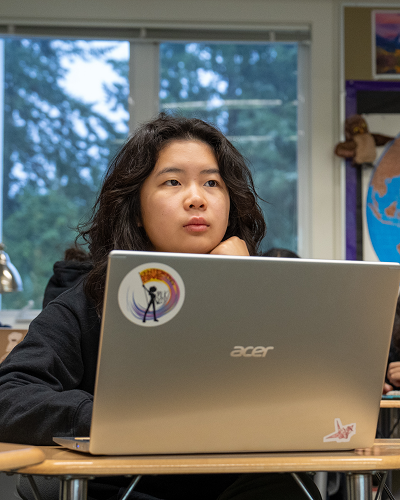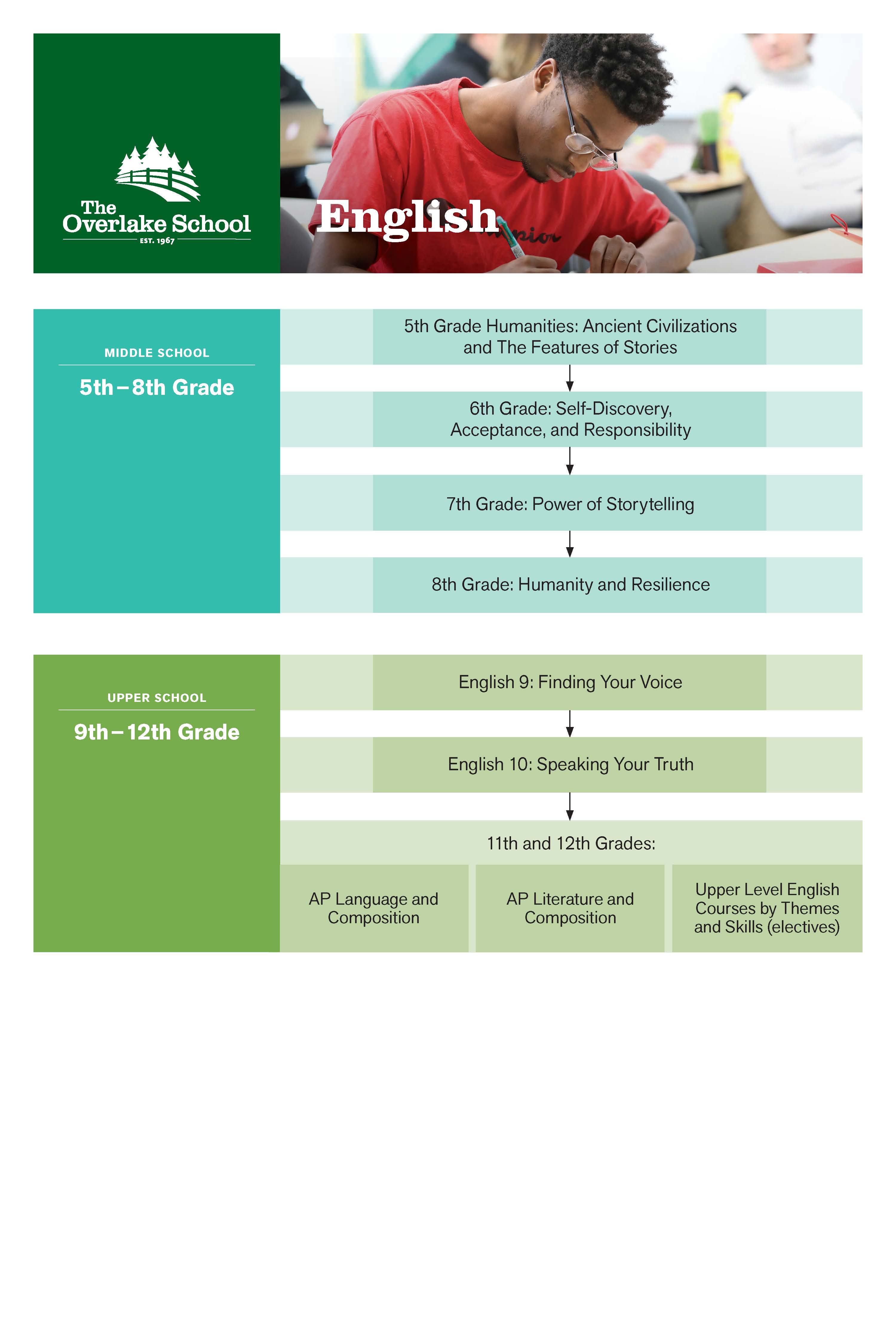English
The Overlake English Department fosters a passion for learning through the study of literature and writing. By cultivating students’ abilities to think critically, read closely, and communicate effectively, we aim to inspire and empower students to become active participants in a diverse and global society.
The Overlake English Department values the power of student voice and student choice. Our classrooms are safe places where students experience mutual respect among peers and adults, where they feel heard, and where their opinions matter. We value risk-taking, as we believe that the best learning takes place on the edges of discomfort. We believe our role as teacher is to foster a community of thinkers while modeling the authenticity and curiosity we hope our students come to embrace.
To make this mission a reality for Overlake students, we focus on three core values:
- Community: We facilitate collaboration among students so that they a) carefully consider their peers’ opinions, b) approach writing as a collaborative process that enriches their thinking, and c) confidently and competently join existing conversations about the larger questions of humanity.
- Authenticity: We expose students to a range of perspectives in literature so that they a) see their identities affirmed and discover their voices, b) build empathy through exploring different experiences, and c) develop a deep appreciation for the variety of lived experiences around the globe.
- Curiosity: We create learning environments so that students a) feel safe and empowered to take risks, b) think and communicate, both critically and creatively, about literature and the questions it provokes, and c) develop a love for reading that extends beyond the humanities classroom.
To learn more about the values surrounding the essential skills in English classes, read the English Department mission.
Curriculum Requirements
Upper School students are required to take four full years of English. English 9 and 10 are required. Juniors and seniors choose one full-year elective.
English 5
Fifth grade English works in tandem with fifth grade social studies to create an integrated study of language arts and history. With myths, stories, and ancient civilizations as the focus, students consider the following essential questions:
What makes a good story?
- How does exposition impact a story?
- How do we determine the theme of a story?
- How does the protagonist’s central conflict help us determine the climax of a story?
- What makes a true friend?
- What makes a hero?
For language arts, students practice close reading skills, strategies for vocabulary development, and effective presentation techniques. Writing focuses on developing an argument through the use of evidence and analysis. In addition, grammar is taught as a fundamental part of the writing process, and students regularly address these skills within their written work. In conjunction with the ancient civilizations curriculum, students read a selection of articles and short stories including “What is a Myth?,” "The Dog of Pompeii," “The All-American Slurp,” and "Ho-ichi the Earless." Students also read three novels, Same Sun Here, Bamboo People, and a retelling of The Odyssey.
English 6
Sixth Grade English explores identity, empathy, and the power of language. In becoming critical readers and expressive writers, students will better understand who they are and discover who they want to be. Our work is guided by six thematic questions:
- How do we define who we are?
- How does the history of our families and culture impact our present?
- How do the different parts of our identity combine to make us who we are?
- How does society shape our experiences in the world?
- How do differences in power and privilege influences our relationships?
- How can we use our voices to advocate for justice and enact change?
Through exposure to a variety of texts including poetry, short stories, novels, graphic novels, and informational texts, students learn to read critically for details, recognize figurative language, and interpret developments in plot, character, setting, and theme. In class discussions and activities, students use textual evidence to support their own thinking and evaluate classmates’ ideas. Texts include New Kid, This Book is Anti-Racist, The Crossover, Harbor Me, The Best At It, Lucky Broken Girl, The Parker Inheritance, As Brave as You, Kira-Kira, Lily and Dunkin, When You Trap a Tiger, Marcus Vega Doesn't Speak Spanish, and various short stories and poetry.
Students will build skills in both analytical and creative writing. Within each form, writing instruction emphasizes increasingly complex and varied sentence structure as well as careful word choice. With guidance, students will revise and edit their own writing as well as that of their peers, paying close attention to organization, style, and the proper grammar, usage, and mechanics of the English language. In addition, students will acquire and utilize new vocabulary through close reading as well as careful study of the vocabulary text, Sadlier-Oxford Vocabulary Workshop Level B.
English 7
7th Grade English explores the following essential questions:
-
- How can stories be told?
- Who gets to tell their stories?
- What power does telling a story have?
Together, we will analyze a variety of texts (poetry, short stories, and novels), reading critically for author’s purpose, figurative language and symbolism, and developments in conflict, characterization, setting, and theme.
We will read a variety of texts, historically including the novels The Outsiders, House of the Scorpion, To Kill a Mockingbird, Tristan Strong Punches a Hole in the Sky, plus one more Human Rights themed novel for Literature Circles; various short stories; various poetry; and non-fiction texts.
Through class discussions and a variety of writing prompts, students will continue refining their ability to construct strong arguments supported by well-chosen textual evidence. This will be structured throughout the year with short, informal journal entries and reflections, formal paragraphs and essays, and interdisciplinary and artistic options. We will continue to build appropriate and sophisticated vocabulary and grammar choices in writing as well.
Vocabulary-building and grammar knowledge units will be yearlong, consisting of stand-alone lessons and practice opportunities through various assessments and writing prompts. Practice will be both in class through mini-lessons and discussions, as well as through the online IXL program.
We will build on communication and listening skills through class discussions, Socratic seminars, and speeches and presentations. Because of the demanding and sensitive nature of the topics we will be studying, we will present specific and targeted instruction on constructive questioning skills by seeking understanding first, assuming best intentions, and building empathy.
English 8
Essential questions guide the English 8 curriculum:
- Testing our mettle: How do we show resilience?
- What does it mean to be human?
Through literature, writing assignments, and discussion, eighth graders consider these age-old questions, seeking to understand more about themselves, others, and characters in our texts. Novels typically include A Separate Peace, Of Mice and Men, A Gathering of Old Men, and Half Brother. In addition, students study other genres, which may include short stories, non-fiction, poetry, vignettes, and drama (Romeo and Juliet, “Thunder on Sycamore Street”). The program emphasizes a formal approach to writing via structured paragraphs and multi-paragraph essays, with special attention to word choice, sentence structure, provable root sentences, effective transitions, introductions, and conclusions. In addition, students write poetry, practicing creative writing techniques such as the use of brevity, figurative language, line breaks, and various style of rhyme and repetition. Eighth graders further develop communication skills through leading discussions, presenting their writing and delivering speeches. Literature and writing components are supplemented by continued study of grammar, usage, mechanics, and vocabulary.
English 9
The theme for English 9 is “Finding Your Voice” which we will explore through both internal and external lenses as we examine not only how our unique voices are shaped, but also how our voices can create change in the world. Throughout the year, each student will be challenged to find, use, and expand their voice, as well as to examine the voices of the authors we study. This course features a variety of active speaking opportunities including seminar-style discussions, group presentations, formal speeches and debates, dramatic vignettes, and impromptu speeches. Writing projects include formal analytical essays, short stories, journal-style creative writing, position pieces, and poetry. Because knowing ourselves as learners is as valuable as the learning itself, students will frequently self-reflect on their progress as readers, writers, speakers, and critical thinkers throughout the duration of the course. Readings will include a variety of classic and modern short stories and poetry, choice reading books, and longer key texts such as Night, The House on Mango Street, and A Raisin in the Sun. Through long-term projects, students will learn executive functioning skills such as back planning, chunking, and time management. A required part of this course is attending office hours in order to foster students’ interpersonal communication and self-advocacy skills, as well as to personalize their learning experience in this class.
English 10
English 10 is the second year of a two-year sequence that introduces the fundamentals of close reading and literary analysis by examining different literary genres. English 10 picks up where English 9 ends and thematically focuses on "Speaking Your Truth." To that end, English 10 is guided by the following four essential questions:
- Who do you want to be?
- What choices do you have to make?
- How do you express yourself?
- Where does that take you?
This year, we will build upon the reading, writing, and discussion skills established in 9th grade. Students will write personal responses and a variety of analytical essays; we take a process-oriented approach that equips students with pre-writing, writing, and editing strategies to tackle different types of writing. Building upon the discussion and public speaking skills developed during the 9th grade, students will take more leadership in group discussions. The texts in English 10 expose students to different voices and possibilities about how individuals understand themselves within their respective worlds. Overall, we hope that students become increasingly comfortable with ambiguity and come to appreciate a variety of stories.
Literature and the Law
“Literature and the Law” explores the intersection of storytelling and legal principles. Students will study fiction, non-fiction, and real legal cases, analyzing how literature reflects, critiques, and shapes societal views on justice, morality, and human rights. The course encourages critical thinking about the role of law in both literature and real-world issues. English electives will feature comparable assessments and workloads, ensuring a balanced academic experience across courses. Second semester electives will also include a research component.
Voices of the Harlem Renaissance
“Voices of the Harlem Renaissance” explores the transformative cultural and intellectual movement of the 1920s. Students will study the literature, music, and art that emerged from Harlem, analyzing how these influential artists and thinkers shaped American identity, race, and social change during this pivotal era. This course encourages critical connections between the Harlem Renaissance and future movements in civil rights. English electives will feature comparable assessments and workloads, ensuring a balanced academic experience across courses. Second semester electives will also include a research component.
Reading the Pacific Northwest
“Reading the Pacific Northwest” explores the rich literary, musical, and artistic traditions of the Pacific Northwest. Students will analyze local literature, poetry, and songs, examining how these works reflect the unique landscapes, history, and cultures of the region. This place-based English course fosters a deeper connection to the local environment, encouraging a deeper understanding of regional identity through the lens of artistic expression. English electives will feature comparable assessments and workloads, ensuring a balanced academic experience across courses. Second semester electives will also include a research component.
Science Fiction and Philosophy
“Science Fiction and Philosophy” explores the intersection of speculative fiction and philosophical inquiry. Students will study contemporary and classic science fiction literature and film, examining questions about ethics, existence, technology, and the future. This course encourages critical thinking about how fictional worlds challenge our understanding of reality, society, and the human condition. English electives will feature comparable assessments and workloads, ensuring a balanced academic experience across courses. Second semester electives will also include a research component.
Voices of Resistance and Resilience
“Voices of Resistance and Resilience” explores the power of literature and art more broadly in shaping movements for social change. Students will study works from historically marginalized communities, exploring themes of protest, survival, and empowerment. This course encourages critical thinking about how creative expression has been used as a tool for resistance throughout history. English electives will feature comparable assessments and workloads, ensuring a balanced academic experience across courses. Second semester electives will also include a research component.
Advanced Topics in English: Social Justice & Literature
This is a course that will examine the voices of historically marginalized communities, how art and literature elevate those voices, and how history and/or current events create, reinforce, and challenge systemic inequality. In this class, you can expect to read from a variety of genres and formats – from novels, short stories, and poetry, to editorials, biographies, and other non-fiction pieces.
Biography, Autobiography, and Memoir
“Biography, Autobiography, and Memoir” explores the art of personal storytelling and the ways individuals construct and share their identities through narrative. Students will engage with a range of texts—including traditional biographies and autobiographies, graphic memoirs, and documentaries—exploring how these works navigate memory, truth, and self-representation. This course encourages reflection on how personal narratives connect to larger cultural and historical contexts. English electives will feature comparable assessments and workloads, ensuring a balanced academic experience across courses. Second semester electives will also include a research component.
Advanced Topics in English: Interdisciplinary Connections in Literature
This is a course that will examine how literature is a reflection of the greater human experience. You can expect to consider the connections between literature and nonfiction works and other disciplines such as history, current events, science, ethics, and more. Students can expect to read a variety of genres and media, from long-form texts to poetry, journalism, short stories, films, biographies, memoirs, and more. The course will focus on essential questions about human experiences and how we consume information through the written word.
Advanced Topics in English: Cinema as Literature
This is a course that will examine films as texts through historical, artistic, and/or thematic analysis. Similar to how many English courses read traditional literature (novels, short stories, etc.) as a learning tool, this course will ask students to “read” a variety of films. This could include traditional cinema (feature films/movies), documentaries, short films, and/or television programs, all from a variety of genres or animated / live-action styles. This course may focus on the history and craft of film as an important communication tool, the art of crafting a thoughtful story through motion images, or a combination of the two.
AP English Language and Composition
As a junior or senior year English course, AP Language and Composition focuses primarily on American non-fiction texts. The course undertakes a rigorous study of rhetoric and argumentation, mirroring the content and level of assignments found in introductory college-level composition courses. Students respond directly to a wide variety of American readings from the early years of democracy to contemporary life: letters, speeches, essays, novels, short fiction, articles, and image-based texts. In addition to the chief emphasis on non-fiction and political rhetoric, other anchor texts for the course include Fast Food Nation, Just Mercy, and The Things They Carried. The course addresses the essential questions of the American experience: What is the American Dream of success, and have all groups had an equal opportunity to pursue it? What are the philosophical underpinnings of American social and political thought, and how do Americans approach and respond to conflict in these realms? In the fall, students delve into the elements of rhetoric that authors use to influence their audiences: the classical rhetorical appeals, tropes, schemes, tone, syntax, diction, imagery, and symbolism. Spring work includes mastering the formal elements of argumentation and the researched synthesis argument essay on an issue of controversy in American society. Students use these understandings and close reading habits to improve their own writing through emulation and adaptation. The end goal is for students to use the lens of rhetoric to comprehend and evaluate any text by analyzing language with critical precision. The College Board notes that the course “cultivates the reading and writing skills that students need for college success and for intellectually responsible civic engagement.”
View the College Board AP English Language and Composition Course Description
AP English Literature and Composition
AP English Literature and Composition is designed to provide students with a college-level approach to reading, writing, and critical analysis in advance of the National Exam in May. Students will examine a wide range of genres and periods, ranging from Antiquity to the 21st Century, in order to consider how and why authors create meaning in various texts. They will read poetry, prose, drama and satire, as well as philosophical works and literary theory in order to provide insight into questions of textual production, authorship, theme, and symbolism. Students will be asked to consider how certain topics, such as identity, power, trust, love, oppression, isolation, and struggle are interpreted by authors in different cultures and time periods. Moreover, they will be encouraged to reflect upon how these universal ideas relate to their own lives. Through their writing assignments and projects (including a longer research paper), members of the class will get the opportunity to engage with broad questions by means of close analysis. In other words, they will use their interpretations of specific texts as a way to think about universal dilemmas.
View the College Board AP English Literature and Composition Course Description.
Seriously Funny: The Rhetoric of Humor
This course explores how comedic texts and performers – from around the world and close to home -- challenge our perception of reality as well as our societal and political assumptions. Some feel that humor moves our society forward and humanizes the experiences of others, whereas others feel that humor reinforces stereotypes and solidifies divisions. We will examine the dangers inherent in such controversial expression and the power that humor can bring to marginalized voices. The course considers satire, parody, and humor found in essays, stories, poetry, drama, songs, political cartoons, memes, film, television, and stand-up comedy. We will also examine current libel laws, the extent of free speech, disgraced writers /performers, and possibly banned texts. Students will write analytical pieces, teach and provide class material, practice emulating humorous forms, complete the senior research paper, and perform or create a final capstone project that is seriously funny. Ellen DeGeneres and the cast of Saturday Night Live will fly in to teach several classes. JK. In her place, an Overlake alum has offered to make cameo appearances.
Tell Me a Story: The Power of Stories in Human Experience
Tell Me a Story: The Power of Stories in Human Experience aims to engage students through reading stories by American writers:
1) for inspiration
2) to provide insight into the varieties of human experience
3) to enhance close-reading skills for appreciation of writing techniques for various purposes in telling a story
4) to write analytically and creatively in response to readings and discussion.
The course is discussion-based and will include opportunities for student choice of stories to read and discuss. The instructor will also choose stories for the class to read and discuss including fiction, nonfiction, podcasts, music, film, and plays. Students will write to analyze stories, craft creative writing work (your own stories), and explore questions emerging from research on how and why stories do what they do.
Beyond the American Dream
The American Dream is alive and well and available to anyone. But is it, really? What does it mean when we hear that someone has “achieved the American Dream”? What belief systems are we reinforcing? What assumptions are at work? This course will draw upon fiction, memoir, essays, poetry, and comics (with authors such as F. Scott Fitzgerald, Zora Neale Hurston, James Baldwin, Ta-Nehisi Coates, Elizabeth Acevedo, Kamala Khan, and Amanda Gorman, as well as artists from the Harlem Renaissance) to question the limits of the American Dream. We will consider the role that gender, race, sexuality and other identifiers play in our access to the American Dream. Questions we will explore include: What is the myth of the American Dream? How do elements of our identities influence our definition of and access to the American Dream? Is the American Dream an attainable—or even worthwhile—pursuit? Students will complete a range of assignments—analytical essays, personal reflection, narrative writing, poetry, and presentations—as they grapple with these questions. One of the goals of the course is to think critically about the systems of power and privilege at work in any conversation about the American Dream.
Future Selves
This course could be called androids, aliens, and monsters, oh my! From a dystopic world where math reigns supreme to an alternative present-day where time-bending aliens make first contact, from a brilliant scientist’s monstrous creation to a young woman’s search for self against the backdrop of an intergalactic university, this course will draw upon both classic science fiction and more contemporary speculative fiction to introduce students to key elements of the genre. Students will explore the themes of science fiction as a way to understand social issues and problems of the human condition as represented in literature, television, and film. Students will read authors such as Mary Shelley, Ted Chiang, Isaac Asimov, Octavia Butler, N. K. Jemisin, and Nnedi Okorafor. Students will also watch the iconic films Metropolis and Bladerunner among others as well as watch popular television shows like Star Trek (original series and The Next Generation) and The X-Files. Questions we will consider include: What does it mean to be human? What if there are other life forms “out there”? What can we learn about ourselves from “the other”? Students will write analytical and reflective pieces as well as practice emulating the elements of science fiction in their own original writing as they think critically about the ever-changing world around them.
Radical Empathy: Finding Meaning in the World Around Us
This senior elective explores central questions surrounding what it means to engage meaningfully in the world: What do people seek in their connections with others? Why? What do we pursue in our lives and why are those things important to us? How do humans respond to hardship and pain? What is authentic empathy, and what role does it play in our daily interactions with others? The class will read a mix of fiction and nonfiction with primary readings from: Colum McCann, Emily St. John Mandel, M.K. Asante, Sonali Deraniyagala, and Eli Saslow. In addition to exploring the questions through the readings, students will grapple with their ideas in analytical and reflective writing. The material will push students to develop their reading, writing, and discussion skills so that they can think more deeply about their own experiences right now and be fully prepared for the challenges they encounter in the future.
Contact
Sarah Gallagher
English Department Chair
sgallagher@overlake.org




